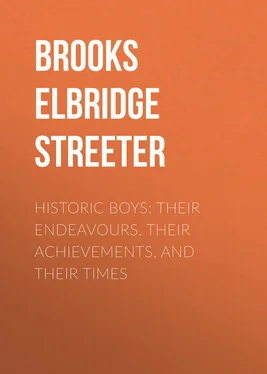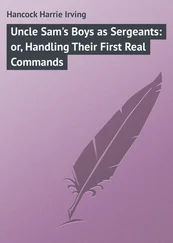Elbridge Brooks - Historic Boys - Their Endeavours, Their Achievements, and Their Times
Здесь есть возможность читать онлайн «Elbridge Brooks - Historic Boys - Their Endeavours, Their Achievements, and Their Times» — ознакомительный отрывок электронной книги совершенно бесплатно, а после прочтения отрывка купить полную версию. В некоторых случаях можно слушать аудио, скачать через торрент в формате fb2 и присутствует краткое содержание. ISBN: , Жанр: foreign_antique, foreign_prose, Биографии и Мемуары, на английском языке. Описание произведения, (предисловие) а так же отзывы посетителей доступны на портале библиотеки ЛибКат.
- Название:Historic Boys: Their Endeavours, Their Achievements, and Their Times
- Автор:
- Жанр:
- Год:неизвестен
- ISBN:http://www.gutenberg.org/ebooks/27157
- Рейтинг книги:3 / 5. Голосов: 1
-
Избранное:Добавить в избранное
- Отзывы:
-
Ваша оценка:
- 60
- 1
- 2
- 3
- 4
- 5
Historic Boys: Their Endeavours, Their Achievements, and Their Times: краткое содержание, описание и аннотация
Предлагаем к чтению аннотацию, описание, краткое содержание или предисловие (зависит от того, что написал сам автор книги «Historic Boys: Their Endeavours, Their Achievements, and Their Times»). Если вы не нашли необходимую информацию о книге — напишите в комментариях, мы постараемся отыскать её.
Historic Boys: Their Endeavours, Their Achievements, and Their Times — читать онлайн ознакомительный отрывок
Ниже представлен текст книги, разбитый по страницам. Система сохранения места последней прочитанной страницы, позволяет с удобством читать онлайн бесплатно книгу «Historic Boys: Their Endeavours, Their Achievements, and Their Times», без необходимости каждый раз заново искать на чём Вы остановились. Поставьте закладку, и сможете в любой момент перейти на страницу, на которой закончили чтение.
Интервал:
Закладка:
"Like you? O noble young Prefect!" began the shepherd, protestingly. But when, at a word from Marcus, the three lads drew back their arms as if to brandish their weapons, and shouted their cry of attack, the mouth of Lydus stood wide open in amazement, his cropped head fairly bristled with fright, and, with a hasty exclamation, he turned on his heel, and fled from the basilica .
"Ho there, bring him back!" Marcus commanded; and guarded by two lictors, Lydus was dragged reluctantly back into the presence of the young prefect.
"So, my shepherd," said Marcus, "thou hast recognized thy villainous rascals. Surely, though, thy fear was larger than thine eyeballs; for thou didst multiply both the followers and the harm done to thee. Thou hast asked for justice, and justice thou shalt have! Forasmuch as I and my companions did frighten thee, though but in sport, it is wise to do well what doth seem but just. I, then, as prefect of the city, do fine Marcus Annius Verus, Aufidius Victorianus, and Sejus Fruscianus, each, one hundred sestertii (about twenty shillings), for interfering with travellers on the public highway; and I do command the lictors to mark the offenders unless they do straightway pay the fine here laid upon them."
Aufidius and Sejus looked troubled. They had barely a hundred sestertii between them; but Marcus drew forth an amount equal to the three fines, and, handing the money to an accensus , bade him pay the shepherd. With many a bow, Lydus accepted the money, and with the words, "O noble young Prefect! O wise beyond thy years!" he would have withdrawn again.
"Hold!" said Marcus, ascending the tribunal, "hear the rest! Because thou hast placed a false charge before this tribunal, and hast sought to profit by thy lying tongue, I, the Prefect, do command that thou dost pay over to the scriba (clerk of the court) the sum of three hundred sestertii , to be devoted to the service of the poor; and that thou dost wear the wooden collar until thy fine is paid."
Very soberly and ruefully, Lydus paid over as the price of his big stories exactly the sum which he had received from the scriba , and departed from the basilica of the boy prefect, if not a poorer, at least a sadder and a wiser man.
The days of Marcus' magistracy were soon over, and when the great festival of Jove was ended, and the magistrates had returned to the city, the lad gave up the curule chair and the dress and duties of his office, and retired to his mother's house, bearing with him the thanks of the magistrates, the approval of the Emperor, and the applause of the people.
The villa of the matron Domitia Lucilla, the mother of Marcus, stood embowered in delightful gardens on the Cœlian Hill, the most easterly of the famous Seven Hills of Rome. In an age of splendor, when grand palaces lined the streets and covered the hill-slopes of the imperial city, when fortunes were spent upon baths and gardens, or wasted on a gala dress, or on a single meal, this pleasant house was conducted upon a plan that suited the home ways of the mother and the quiet tastes of the son. Let us enter the spacious vestibule. Here in the door-way, or ostium , we stop to note the " Salve! " (Welcome!) wrought in mosaic on the marble floor, and then pass into the atrium , or great living-room of the house, where the female slaves are spinning deftly, and every thing tells of order and a busy life. Now, let us pass on to the spacious court-yard, in the very heart of the house. In the unroofed centre a beautiful fountain shoots its jets of cooling spray from a marble cistern of clear water.
And here, by the shining fountain, in the central court, stand two persons – Marcus and his mother. The lad has laid aside his toga , or outside mantle, and his close-fitting, short-sleeved tunic, scarcely reaching to his knees, shows a well-knit frame and a healthy, sun-browned skin. His mother, dressed in the tunic and long white stola , or outer robe, is of matronly presence and pleasant face. And, as they talk together in low and earnest tones, they watch with loving eyes, from the cool shadows of the high area walls, the motions of the dark-eyed little Annia, a winsome Roman maiden of thirteen, as, perched upon a cage of pet pigeons, she gleefully teases with a swaying peacock plume now the fluttering pigeons and now the wary-eyed Dido, her favorite cat.
"But there is such a thing as too much self-denial, my Marcus," said the mother in answer to some remark of the lad.
"Nay, this is not self-denial, my mother; it is simple justice," replied the boy. "Are not Annia and I children of the same father and mother? Is it just that I should receive all the benefit of our family wealth, and that she should be dependent on my bounty?"
"Divide then thy father's estate, my son. Let Annia and thyself share alike, but give it not all to thy sister," his mother suggested.
"'Receive wealth without arrogance and be ready to let it go,' is what the Stoic Commodus hath taught me," the boy replied. "To whom we love much we should be ready to give much. Is it not so, my mother?"
"So I believe, my son," the matron answered.
"And if I seek to act justly in this matter, shall I not follow thy counsels, my mother?" Marcus continued; "for thou hast said, 'No longer talk about the kind of a man a good man ought to be, but be such.'"
"Ah, Marcus," the pleased mother exclaimed, "thou wilt be a happy man, too, if thou canst go ever by the right way, and think and act in the right way, as now. Thou art a good youth."
"And what is goodness, mother," argued the young philosopher, "but the desire to do justice and to practise it, and in this to let desire end? Let me, then, as I desire, give all my father's estate to my sister Annia. My grandfather's is sufficient for my needs. So shall Annia have her fair marriage portion, and we, my mother, shall all be satisfied."
And now, his sister Annia, wearying of her play with the pigeons, dropped her peacock plume and ran merrily toward her brother.
"O Marcus," she cried, "'t will soon be time for the bath. Do come and toss the pila with me; – that is," she added, with mock reverence, "if so grand a person as the prefect of Rome can play at ball!"
"And why not, my Annia," asked her mother, proudly; "even the world-ruling Julius loved his game of ball."
"Ah, but our Marcus is greater than the great Cæsar. Is he not, mother?" Annia asked, teasingly.
"Aye, that he is," the mother answered, feelingly; "for, know that he has this day given up to thee, his sister, one half of his heritage, and more – unwise and improvident youth!" she added, fondly.
"So let it end, mother," the boy said, as the pretty Annia sprang to him with a caress. "Come, Annia, let us see who can toss the pila best – a woman of property, such as thou, or the prefect of three days." And as hand in hand the brother and sister passed cheerily through the pillared portico, the mother looked after them with a happy heart and said, as did that earlier noble Roman matron of whom history tells us: " These are my jewels!"
The days passed. Winter grew to spring. The ides of March have come. And now it is one of the spring holidays of Rome, the fourteenth of March in the year 138 – the Equiria , or festival of Mars. Rome is astir early, and every street of the great city is thronged with citizens and strangers, slaves and soldiers, all hurrying toward the great pleasure-ground of Rome – the Circus Maximus. Through every portal the crowds press into the vast building, filling its circular seats, anxious for the spectacle. For the magistrate of the games for this day, it is said, is to be the young Marcus Annius, he who was prefect of the city during the last Latin Games; and, more than this, the festival is to close with a grand venatio – a wild-beast hunt!
Читать дальшеИнтервал:
Закладка:
Похожие книги на «Historic Boys: Their Endeavours, Their Achievements, and Their Times»
Представляем Вашему вниманию похожие книги на «Historic Boys: Their Endeavours, Their Achievements, and Their Times» списком для выбора. Мы отобрали схожую по названию и смыслу литературу в надежде предоставить читателям больше вариантов отыскать новые, интересные, ещё непрочитанные произведения.
Обсуждение, отзывы о книге «Historic Boys: Their Endeavours, Their Achievements, and Their Times» и просто собственные мнения читателей. Оставьте ваши комментарии, напишите, что Вы думаете о произведении, его смысле или главных героях. Укажите что конкретно понравилось, а что нет, и почему Вы так считаете.












